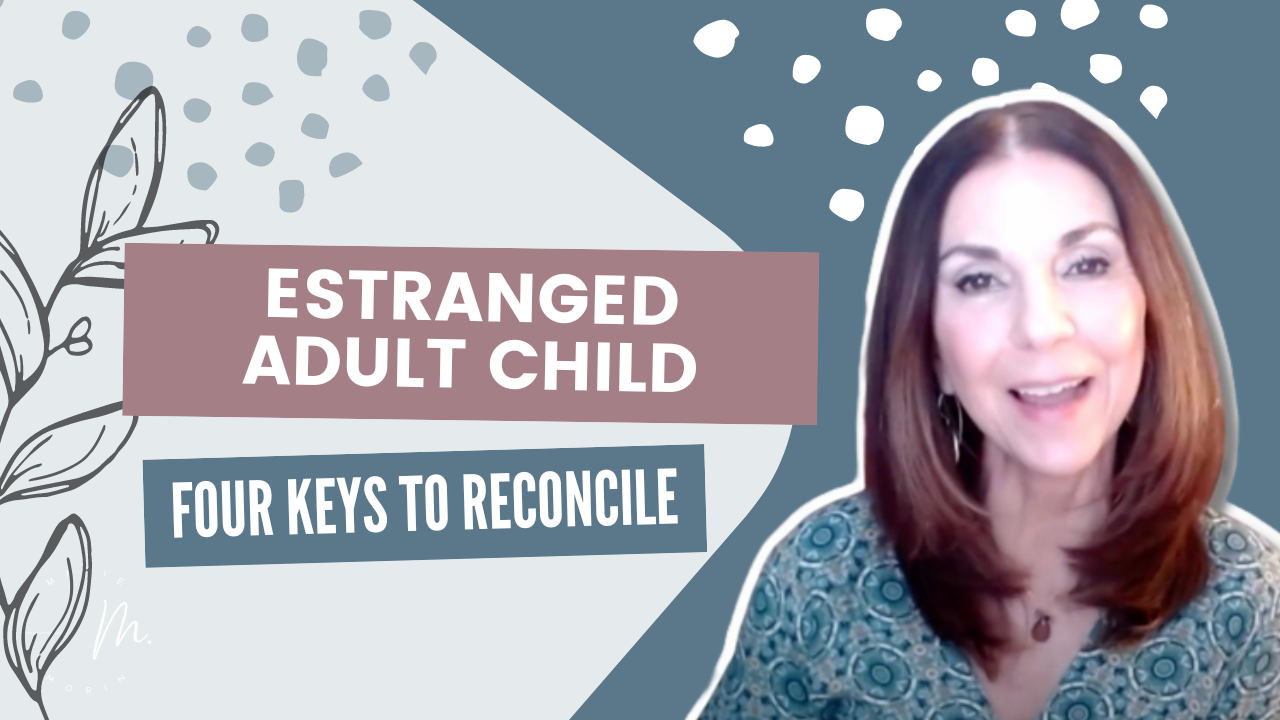Are you wondering how to reconcile with your adult child after estrangement? If you hope to reconcile, the four keys to dealing with your estranged adult child involve adjusting your perception.
To reconcile is to make amends, settle a dispute, and call for a cease-fire. Often there is no way to reconcile the two versions of your situation, and reconciliation is accepting that fact. Reconcilers of estrangement are willing to relinquish needing to win their point. To reconcile when two opposing viewpoints relate to one’s resignation, the need for both sides to agree on one narrative can be arduous.
Expectations are often at the forefront of the rift between parents and adult children. In addition, a solid foundation for reconciling includes getting support, stretching your objectivity muscle, and growing your communication skills.
This article examines Four Keys to Handling Your Estranged Adult Child When You Want to Reconcile:
1. Examine Your Expectations
Reconciliation is a process in which you want to take your time. Knowing how long it will take is unique to each relationship. The average length of Estrangement is 4.5 years, so you need to acknowledge and work towards accepting that this will take time. The uncertainty of what will happen and how to repair it can be very unsettling. If you expect resolutions soon or immediately, know it may be challenging. If you are newly estranged and in the throes of grief, you could be anxious, sad, guilty, in denial, and shocked. Grieving is a challenging process that you cannot afford to run. By shifting your expectations from needing to reconcile NOW, you can accept your current state and begin to heal.
2. Get Support
Whether you’re recently estranged, or it’s been going on for some time, the stress of the cut-off is easier to handle with someone who can support you. Grieving over an estranged adult child is unlike grieving when someone passes because your adult child has decided not to see you.
Many parents feel the stigma of having this condition and tend to isolate themselves. Seeing a professional will help you better navigate what you are feeling and help you to get through.
As a parent, being cut off can be devastating and heartbreaking. Deep sadness can facilitate isolation and neglect of physical and emotional needs. Parents can become so upset and dysregulated that they unknowingly say or do things that harm their relationship and prolong estrangement—getting support from a professional specializing in estrangement or a family therapist who will help you work through your relationship and teach communication skills. Step-by-step help from a therapist can help you feel alone.
3. Assess Your Relationship While Aiming For Objectivity
No parent is perfect, and every relationship has its problems. Learning to look at the plausible causes of the relationship loss objectively may help you better understand your adult child. What has your adult child told you about your relationship that perhaps peaked your defensiveness? Has your child had to deal with family conflict and poor parenting? A considerable obstacle when considering reconciling is the insistence that the other party listens and agrees with your version of the past. Objectively assessing means you suspend the need to say I am right, and they are wrong. Indeed, both parties’ versions are valid and deserve attention. Estrangement is full of happenings tied to painful histories. Parents may express strong beliefs about where their adult child missed the mark. The inverse may also be true. When expectations are imposed and unmet, clashes occur. If you are hoping to reconcile, empathize with what your adult child has told you so that you can genuinely validate them.
4. Improve Your Communication Skills
Now that you’re objectively assessing your relationship, it’s imperative to work on how to communicate with your adult child. You may not have any contact with them, but when the time approaches, you want to equip yourself with skills in validating and listening so your adult child can see that you have changed. Let’s be honest and recognize that parents are often very generous with their opinions and criticisms. Parents tend to say things that adult children can perceive as disrespectful, hyper-critical, and discouraging. Learn how to respectfully speak with your child and validate what they say to you, even if it is painful. By being aware of your communication style with your adult child, you can thoughtfully engage in a manner that facilitates reconciliation.
Estrangement is a grueling experience for all parties. When adult children cut ties, parents experience grief and are often bewildered. Estranged parents hope to reconcile and resume their relationship. Unfortunately, estrangement can last four and one-half years, so there is no quick way to resolve your distanced relationship with your adult child. However, if you hope to have a stronger bond, your time waiting can become an opportunity to grow. Estranged adult children cut ties.
Parent-adult child relationship feels harmful. Many grown kids report wanting their parents to behave differently; they want their parents to change genuinely. Parents who intentionally consider their expectations, get support, improve their ability to emphasize through objectivity, and master communication skills are a good chance of creating the change necessary for a better relationship.
This article examines Four Keys to Handling Your Estranged Adult Child When You Want to Reconcile.





